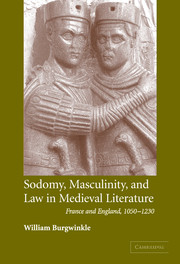Book contents
- Frontmatter
- Contents
- Acknowledgments
- Prologue
- Introduction
- Part I Locating sodomy
- Part II Confronting sodomy
- 3 Making Perceval: double-binding and sièges périlleux
- 4 Queering the Celtic: Marie de France and the men who don't marry
- 5 Writing the self: Alain de Lille's De planctu naturae
- Conclusion
- Notes
- Bibliography
- Index
- CAMBRIDGE STUDIES IN MEDIEVAL LITERATURE
3 - Making Perceval: double-binding and sièges périlleux
Published online by Cambridge University Press: 22 September 2009
- Frontmatter
- Contents
- Acknowledgments
- Prologue
- Introduction
- Part I Locating sodomy
- Part II Confronting sodomy
- 3 Making Perceval: double-binding and sièges périlleux
- 4 Queering the Celtic: Marie de France and the men who don't marry
- 5 Writing the self: Alain de Lille's De planctu naturae
- Conclusion
- Notes
- Bibliography
- Index
- CAMBRIDGE STUDIES IN MEDIEVAL LITERATURE
Summary
The disciplines function increasingly as techniques for making useful individuals. Hence their emergence from a marginal position on the confines of society, … [their] detachment from the forms of exclusion or expiation, confinement or retreat … their kinship with religious regularities and enclosures.
The community … can only maintain itself by suppressing this spirit of individualism, and, because it is an essential moment, all the same creates it and, moreover, creates it by its repressive attitude towards it as a hostile principle. However, this principle, being merely evil and futile in its separation from the universal end, would be quite ineffectual if the community itself did not recognize the power of youth (the manhood which, while immature, still stands within the sphere of individuality), as the power of the whole. For the community is a nation, is itself an individuality, and essentially is only such for itself by other individualities being for it, by excluding them from itself and knowing itself to be independent of them.
When and why do men obey? Upon what inner justifications and upon what external means does this domination rest?
At a key moment in Gerbert de Montreuil's Continuation de Perceval, it is announced to King Arthur that his court sits atop an infernal abyss in which knights who love “young men more than young ladies” are consumed by flames. His first reaction to this news is to turn and address his assembled court in the following terms:
Cil qui sont entechié / De si tres orrible pechié / Pueent estre tot esmari, / Je meïsmes m'en esmari / Quant j'en oï ore parler. / Honis sera au par aler / qui en tel pechié sera pris, / De mal fu soit ses cors espris.
(ll. 1589–1596)- Type
- Chapter
- Information
- Sodomy, Masculinity and Law in Medieval LiteratureFrance and England, 1050–1230, pp. 89 - 137Publisher: Cambridge University PressPrint publication year: 2004



